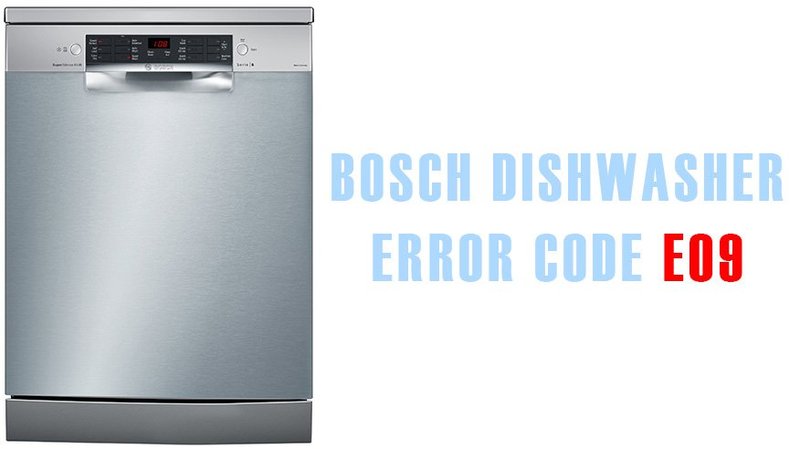
The “OE” error code is essentially your dishwasher’s way of waving a red flag and saying, “Help! I can’t drain the water out.” This typically happens when there’s a problem with the drainage system. It could be a clog in the drain hose or something amiss with the pump. Either way, it’s a sign that your appliance needs some attention. In this guide, we’ll walk through exactly what you need to do to prevent this pesky problem from becoming a regular hassle. By staying one step ahead, you can ensure your dishwasher runs like a well-oiled machine.
Understanding the Bosch Dishwasher’s Drainage System
Imagine the drainage system in your Bosch dishwasher as a network of tiny tunnels. Each part has a job to do, just like a team working to get dirty water out and let clean water in. At the heart of this system is the drain pump, which pushes the used water out of the appliance. If something goes wrong here, it’s like the pump has gone on strike, causing the “OE” error to appear.
Let’s break it down further. The dishwasher’s efficient functioning depends on clear pathways for water to enter and exit. If your drain hose—think of it as a water slide—is blocked, the pump can’t do its job properly. It’s like trying to drink through a straw that’s blocked; no matter how hard you try, the liquid just won’t flow. Similarly, if debris gets caught in the filter or the pump, it can spell trouble.
So, what’s going on under the hood when the dreaded “OE” code appears? Often, it’s an indicator that there might be food particles, grease, or even tiny objects clogging the flow. Regular maintenance and checks can help prevent these issues from cropping up. Just like you wouldn’t let your car go without regular oil changes, your dishwasher benefits from a bit of routine upkeep.
Routine Maintenance Tips to Avoid Error Code OE
Here’s the deal: preventing the “OE” error code is all about keeping things clean and clear. Start with the basics. After each wash, take a quick peek inside the dishwasher. Are there any leftover food particles? It’s easy to overlook this step, but wiping away bits of food can prevent larger problems down the line. It’s just like tidying up as you go when cooking—it saves you a big cleanup later.
Next, focus on the filters. The filters in your Bosch dishwasher catch all sorts of debris. If they get too full, it’s like your sink getting clogged; everything backs up. Make it a habit to clean these every couple of weeks. Simply pop them out, rinse them under warm water, and you’re good to go. If you’d rather not get hands-on, think about it like regular dental hygiene—it’s far better to brush daily than deal with cavity fillings later.
Don’t forget the drain hose, which can become a hidden trouble spot. Every few months, check that there are no kinks or blockages. Picture it like a garden hose, which needs to be straight and clear for water to flow freely. If you find anything suspicious, give it a gentle clean or seek professional help if necessary. Keeping these paths open helps prevent water from backing up, saving you from the dreaded error code.
Smart Habits for Long-Term Dishwasher Health
Now, let’s talk about getting into some good habits. When you’re setting up your dishwasher for a cycle, make sure not to overstuff it. Imagine trying to fit too many books on a shelf; eventually, they’ll topple over or cause the shelf to sag. Loading dishes properly ensures they’re cleaned effectively and keeps the drains clear of blockages.
Another consideration is the type of detergent you use. Opt for high-quality, recommended dishwasher detergents. Cheap or incorrect detergents can leave residues, and over time, these can build up and clog your system—much like how oil and grease can clog household pipes. Keeping a close watch on this can make a world of difference in preventing that “OE” error.
Finally, if you notice the error persisting despite your best efforts, it might be time to call in a professional. Just like visiting a mechanic when your car needs a tune-up, sometimes an expert touch is what’s needed to ensure everything’s functioning smoothly.
In summary, preventing the Bosch dishwasher error code “OE” is all about maintenance and vigilance. By understanding the drainage system, carrying out regular checks, and adopting smart usage habits, you can enjoy trouble-free dishwashing. Remember, a little attention goes a long way in keeping your appliance running efficiently.
Whether it’s cleaning filters or choosing the right detergent, each small step plays a crucial role in your dishwasher’s health. So, next time you hear the comforting hum of a successful wash cycle, know that your efforts have paid off. Keep these tips in mind, and you’ll reduce the chances of running into that pesky “OE” error ever again. Happy dishwashing!